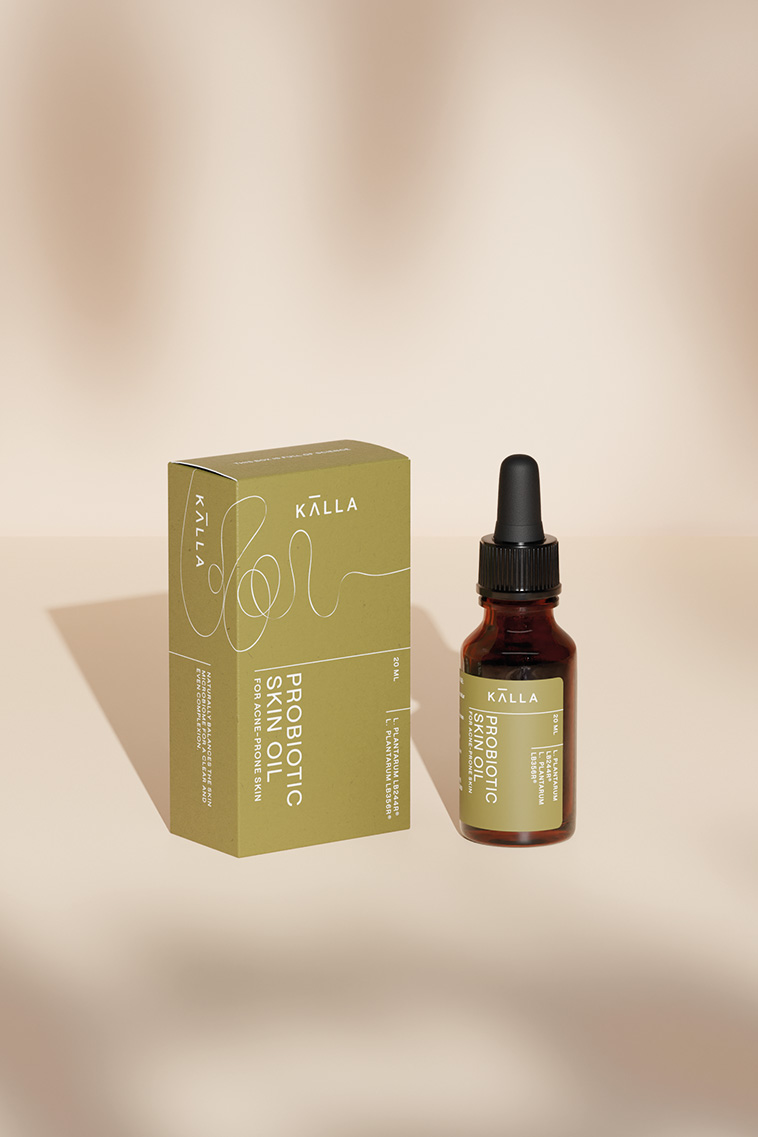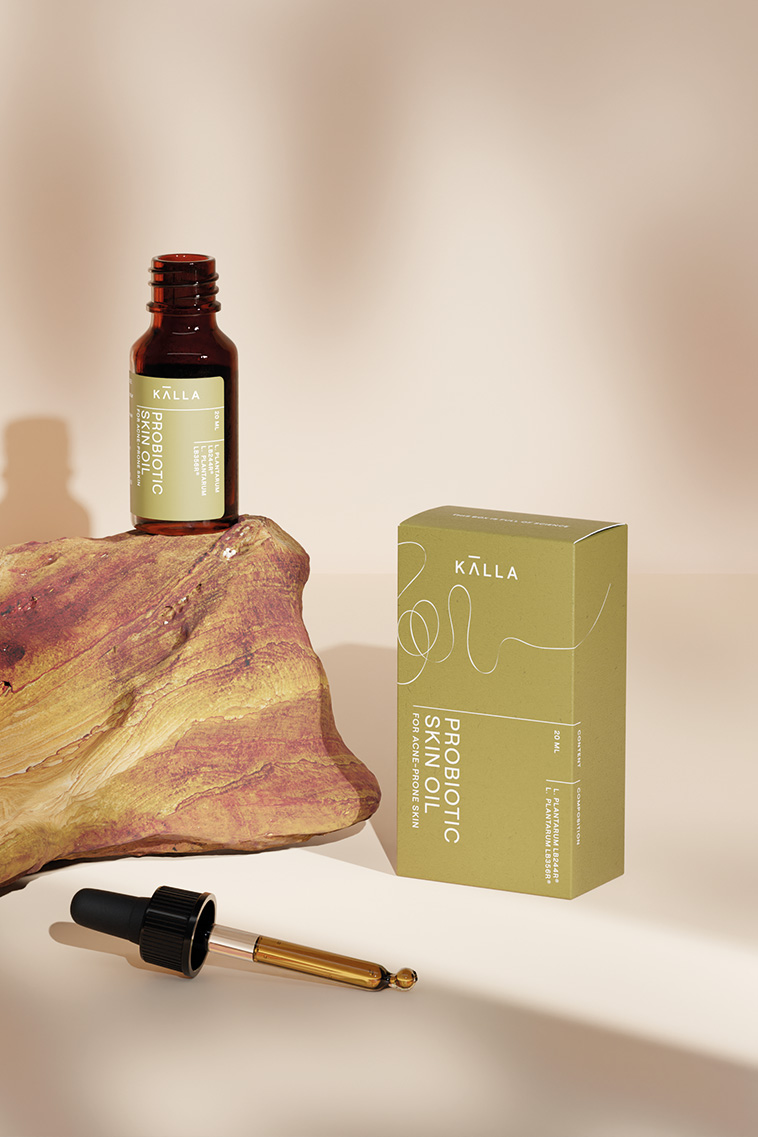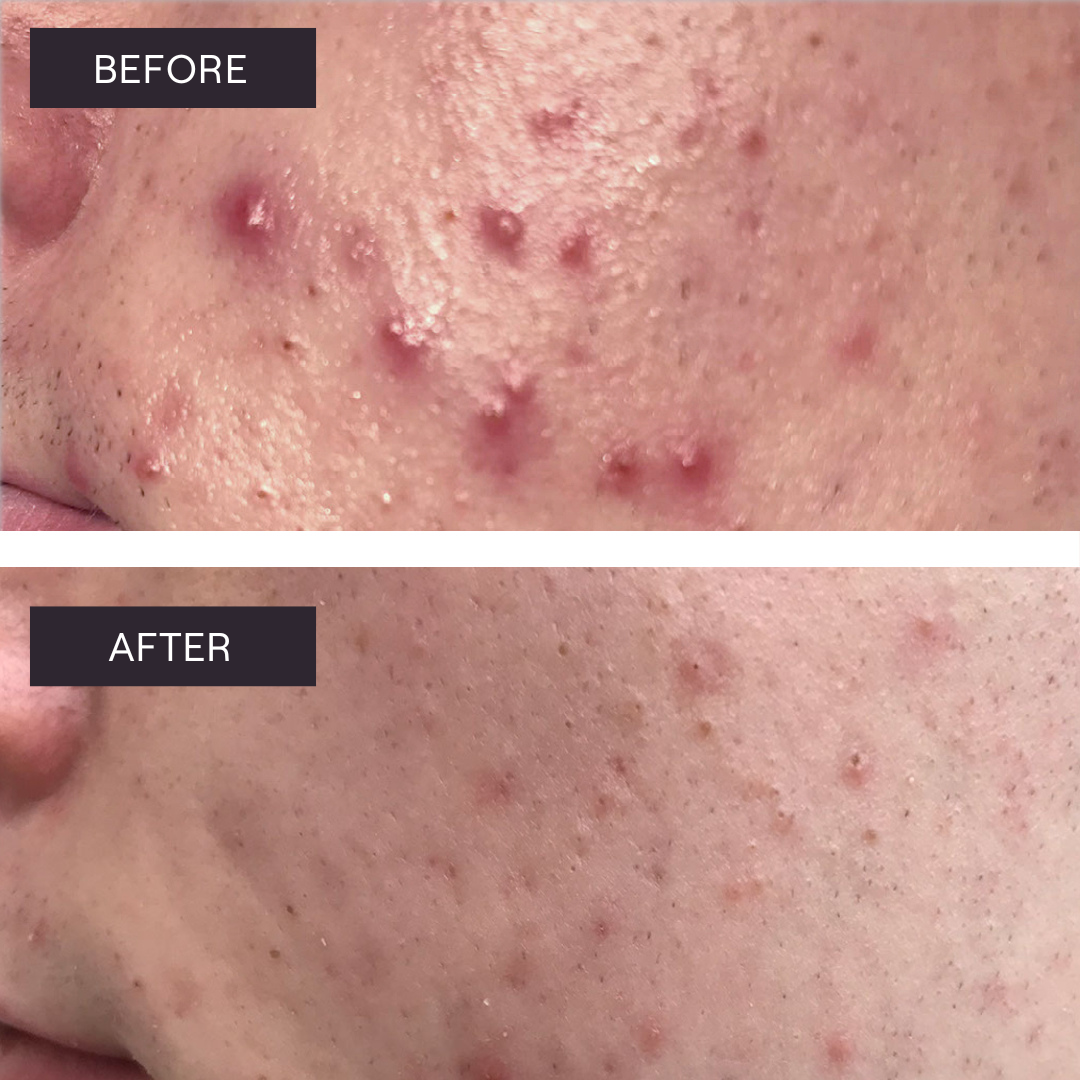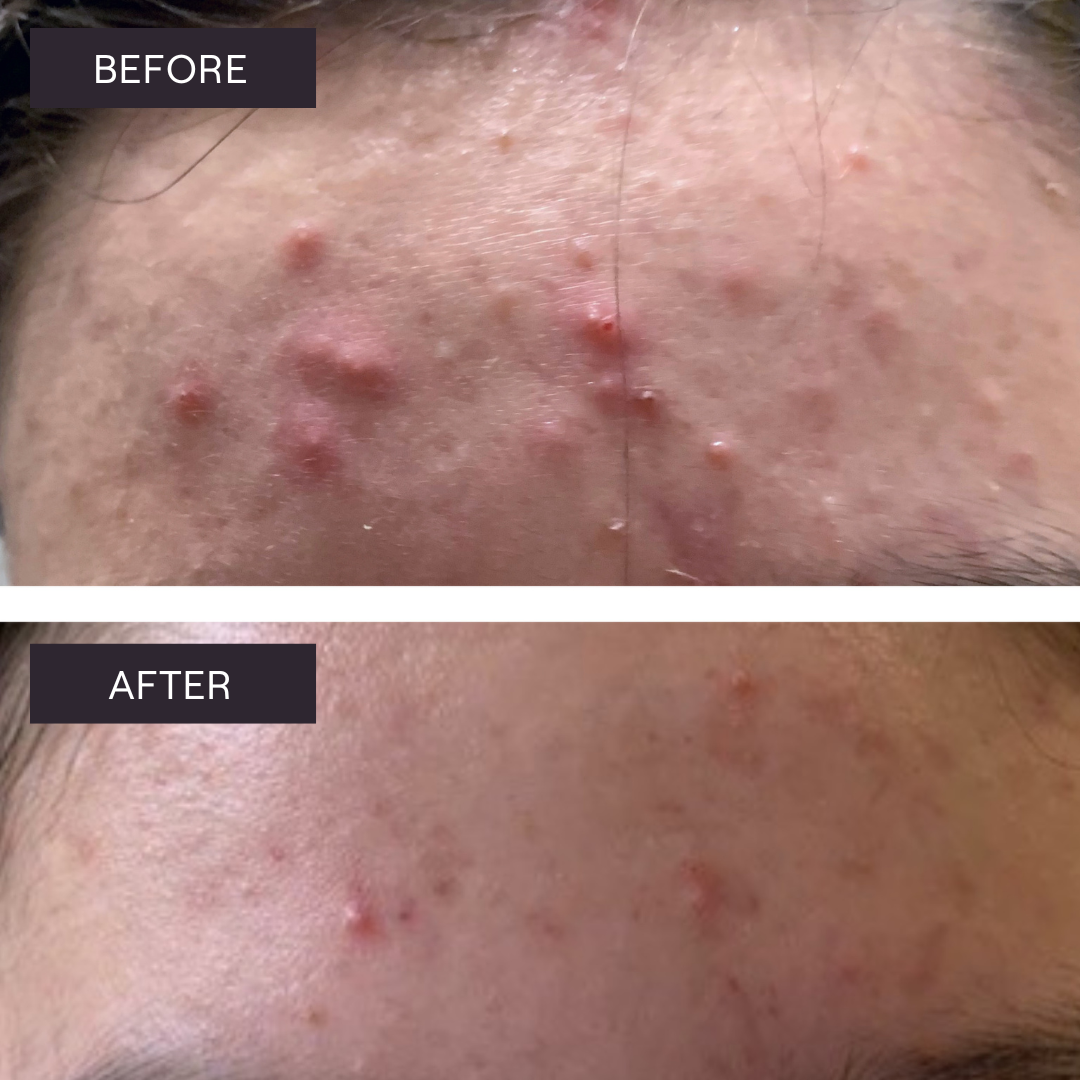SCIENCE-BACKED PROBIOTICS
You've successfully unlocked your new customer discount. Add code REFERRED at checkout to claim your 0 USD discount
· SUBSCRIBE & SAVE · 100% MONEYBACK GUARANTEE ·




SKIN OIL FOR IMBALANCE FOR ACNE-PRONE SKIN
Fast-absorbing and non-irritating, our lightweight probiotic oil is created for skin that’s prone to breakouts. This highly-effective treatment replenishes and balances the skin microbiome and strengthens the skin barrier to heal and prevent blemishes.
Unlike other acne products, ours is vegan, organic, free-from preservatives and perfumes. It’s also kind to teenage skin, and pregnancy and breastfeeding safe. The result: a clearer, brighter complexion in 30 days or your money back.
WHY IT WORKS
FREE FROM IRRITANTS
TO REDUCE REDNESS
MICROBIOME SUPPORTING
FOR BALANCE
HOW TO USE
Apply several drops of oil to the face once or twice, daily.
Use after cleansing and before any other skin care products. Avoid following with products that contain parabens, which kill bacteria (good and bad).
HOW IT WORKS
01.
02.
03.
You've successfully unlocked your new customer discount. Add code REFERRED at checkout to claim your 0 USD discount
· HOW IT WORKS · HOW IT WORKS · HOW IT WORKS · HOW IT WORKS · HOW IT WORKS · HOW IT WORKS · HOW IT WORKS · HOW IT WORKS · HOW IT WORKS · HOW IT WORKS · HOW IT WORKS · HOW IT WORKS · HOW IT WORKS · HOW IT WORKS · HOW IT WORKS · HOW IT WORKS · HOW IT WORKS · HOW IT WORKS · HOW IT WORKS · HOW IT WORKS · HOW IT WORKS · HOW IT WORKS · HOW IT WORKS
THE SCIENCE
In a double-blind clinical study Probiotic Skin Oil For Acne Prone Skin was tested on mild to moderate acne. The results showed that 71% of participants saw a reduction in pimples. The reduction in pimples was on average 62% after using the serum for 28 days. Probiotic Skin Oil for Acne-prone skin takes its superpowers from two strains of live, probiotic bacteria: LB244R® og LB356R®. They inhibit the problematic bacteria Staphylococcus aureus and Cutibacterium acnes—both of which often play a part in people struggling with breakouts.
You've successfully unlocked your new customer discount. Add code REFERRED at checkout to claim your 0 USD discount
· Vegan · Organic · Natural · Microbiome-friendly · Vegan · Organic · Natural · Microbiome-friendly · Vegan · Organic · Natural · Microbiome-friendly · Vegan · Organic · Natural · Microbiome-friendly · Vegan · Organic · Natural · Microbiome-friendly · Vegan · Organic · Natural · Microbiome-friendly · Vegan · Organic · Natural · Microbiome-friendly · Vegan · Organic · Natural · Microbiome-friendly · Vegan · Organic · Natural · Microbiome-friendly · Vegan · Organic · Natural · Microbiome-friendly · Vegan · Organic · Natural · Microbiome-friendly
KEY INGREDIENTS
WHAT'S INSIDE
L. plantarum LB244R
The probiotic strain Lactiplantibacillus plantarum LB244R has been repeatedly shown to balance the skin microbiome, reducing instances of irritation, redness and dry patches.
L. plantarum LB356R
The probiotic strain Lactiplantibacillus plantarum LB356R has been repeatedly shown to bind to C. acnes to reduce breakouts and blemishes without irritating or damaging the skin’s natural state.
JOJOBA OIL
Jojoba Oil is an effective emollient and moisturising oil that has a similar composition to the skin’s own oil (sebum).
SUNFLOWER OIL
Sunflower oil has anti-inflammatory properties, which can help reduce redness and roughness of the skin. It naturally supports and strengthens the outer layers of the skin, whilst keeping it hydrated.
HYDROGENATED OLIVE OIL
A potent source of fatty acids and antioxidants, it is easily absorbed by the skin to moisturise and soften it.
VITAMIN E (TOCOPHEROL)
A well-documented antioxidant that supports all skin types: from acne-prone to eczema, to ageing skin.
CAPRIC TRIGLYCERIDE
Derived from coconut oil, it moisturises and replenishes the skin without leaving it greasy or clogging pores.
FAQs
Acne vulgaris is currently one of the most common and well-known dermatological conditions, affecting around 90 % of the world’s population at some point in their lives. It is often triggered in puberty by hormonal changes and further exacerbated by genetic factors.
Another factor that contributes to acne-prone skin is an imbalance in the skin microbiome, which allows pathogens (harmful bacteria) to colonise the skin. This means that pathogens start to take up more space and nutrition on the skin and outcompete the otherwise beneficial bacteria in the skin microbiome, leading to breakouts.
The skin microbiome refers to the collection of microorganisms that inhabit the human skin. Just like the gut microbiome, which consists of bacteria, fungi, viruses, and other microbes that reside in the digestive tract, the skin microbiome consists of a diverse community of microorganisms that live on the surface of our skin.
The skin microbiome is composed of various species of bacteria, including both beneficial and potentially harmful ones.
It plays a crucial role in maintaining the overall health and functioning of the skin. Disruptions in the balance of the skin microbiome can lead to various skin conditions. For example, an overgrowth of certain bacteria or fungi can contribute to conditions like acne, eczema, or dandruff. Additionally, external factors such as the use of harsh skin care ingredients, soaps, antibiotics, or excessive hygiene practices can disrupt the delicate balance of the skin microbiome.
No, you can keep your skin oil at room temperature. However once opened we recommend using it within 3 months to guarantee survivability of the bacteria.
Everyone’s skin varies. Many people see a difference in their skin within weeks. Our clinical trials, and therefore our before-and-after pictures, capture people who have used the product for 28 days.
We recommend using Probiotic Skin Oil after cleansing with a mild cleanser or micellar water. If acids are part of your routine, you can use these and follow with Probiotic Skin Oil. It is fine to apply Salicylic acid and Hyaluronic acid before applying Probiotic Skin Oil.
After your oil has fully absorbed you can follow with a moisturiser or SPF. Many people report not needed to use a moisturiser due to the nourishing texture of Probiotic Skin Oil.
Generally we recommend waiting for your oil to absorb in your skin before applying your next product. If you want to speed up your routine, apply Probiotic Skin Oil to a damp face as this will accelerate the activation of the probiotics so you can move onto your next product faster.
It's important to avoid using anti-microbial products with probiotics. Anti-microbial ingredients are most common in products intended for treating acne, pimples, and impurities. These substances are designed to kill bacteria, and can't differentiate between the bad ones and the good ones.
You can use retinol and probiotics at the same time if the retinol concentration isn't very high. If the concentration is very high, then use the probiotic and the retinol products on separate occasions (let some hours pass in between application or do one in morning and one at night). Probiotics also produce Vitamin A, so you're already getting some of the helpful vitamin from your probiotic skincare.
Adding Vitamin C to your skincare routine doesn't cause any problems for the probiotics.
Niacinamide is a form of Vitamin B3 and is often applied to reduce irritation, redness and hyper pigmentation. Niacinamide can be used together with probiotic skincare, but again it's best if you separate their application by a few hours, or alternate them in your routine.
Salicylic acid is often used as a chemical feel and as a deep-cleaning ingredient. Salicylic acid is produced by probiotic bacteria, so it's no problem to combine the two.
Hyaluronic acid can be used together with probiotic skincare, and probiotics help to strengthen the skin barrier, which helps the skin to retain moisture.
Avoid skin care that contains zinc. The mineral is often used for treating wounds, and it's perfectly fit for this purpose. However, zinc is antibacterial, which is why it doesn't combine well with probiotic skincare.
Yes you can.
A dry oil that is fast-absorbing (like this product) is ideal for people with oily skin. The Jojoba oil is highly effective at cleansing the skin and balancing the skin’s production of sebum to prevent oiliness and breakouts.
Yes, this oil is appropriate for people with breakout-prone skin or skin that is easily aggravated.
This oil is suited for use on acne-prone skin. If acne is diagnosed with your doctor, they may wish to take you down the pharmaceutical route. You can use PROBIOTIC SKIN OIL alongside oral retinoids and retinols.
You can use PROBIOTIC SKIN OIL alongside oral retinoids and retinols, but it is not compatible with antibacterial topical treatments, as they kill both good and bad bacteria.
Yes. Hormonal acne is primarily caused by fluctuations in hormone levels, particularly an increase in androgen hormones. Androgens, such as testosterone, can stimulate the production of sebum (oil) in the skin's sebaceous glands.
When excess sebum combines with dead skin cells and bacteria, it can clog the pores and lead to the development of acne. PROBIOTIC SKIN OIL FOR ACNE PRONE SKIN, naturally balances the production of sebum and bacteria that lives on the skin’s surface.
Yes, probiotic bacteria is natural and safe for all to use.
Yes
Yes.
The live probiotic bacteria within Probiotic Skin Oil is encapsulated in very small crystals to keep the cells alive, which is why you may notice a slight grainy texture. Humidity, in the air or on the skin, will dissolve the crystals quickly, but sometimes when humidity is low, the crystals may feel like fine peeling. If this happens, add a drop of water to the skin or on your fingers or hands, and the crystals will instantly dissolve.
MONEY BACK GUARANTEE
We're confident that you'll love our products as much as we do. If you're not completely satisfied, simply return your product within 30 days for a full refund.
Customer reviews
No reviews found
You & KÄLLA
Show us how you incorporate KÄLLA into your daily routines by tagging @kalla_official and #IAmKALLA.